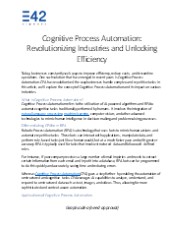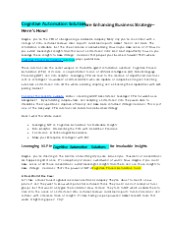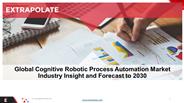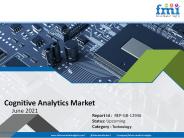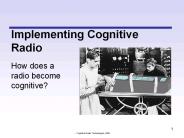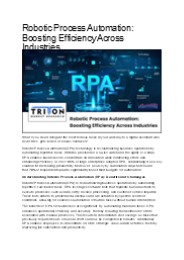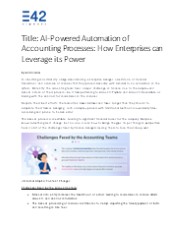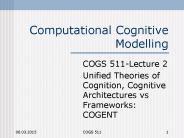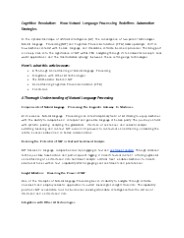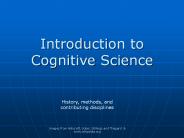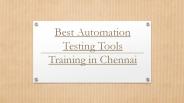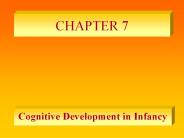Cognitive Automation PowerPoint PPT Presentations
All Time
Recommended
While Robotic Process Automation (RPA) can be used to effectively automate simple and repetitive tasks, Cognitive Process Automation (CPA) takes it a step further, leveraging the power of machine learning and NLP to enable machines to think and act like humans and handle complex business processes. This latest piece from the E42 Blog unpacks the key differences between CPA and RPA and how CPA allows the human workforce to focus on strategic and important tasks—making it the need of the hour when it comes to enterprise automation. Read the full piece to find out how CPA puts the human in the robot and allows for complex business processes to be managed by AI with minimal human intervention!
| PowerPoint PPT presentation | free to download
E42’s latest blog dives deep into how CPA is reshaping industries, going beyond traditional automation by integrating AI and machine learning to handle complex, cognitive tasks.
| PowerPoint PPT presentation | free to download
| PowerPoint PPT presentation | free to download
In today's data-driven landscape, precision and efficiency in data entry are non-negotiable. Traditional methods often come with errors and inefficiencies that can hinder decision-making and operational excellence. In the recent article from the E42 Blog, we delve deep into how Cognitive Process Automation (CPA) can revolutionize data entry and reshape the way businesses handle data, ensuring accuracy and efficiency like never before.
| PowerPoint PPT presentation | free to download
The dynamic synergy between data analytics and cognitive process automation embodies the very essence of data-driven decision-making. In this latest piece from the E42 Blog, we dive deep into the very synergy that has firmly established itself as the bedrock of modern business strategy, ushering in precision, efficiency, and growth for enterprises.
| PowerPoint PPT presentation | free to download
In this context, the role of Cognitive Process Automation (CPA) tools cannot be overstated. These tools are the linchpin of modern customer engagement, enabling businesses to consistently provide personalized, efficient, and value-driven experiences. With CPA tools, every customer interaction becomes an opportunity to create a positive and memorable connection. This subsequently translates to transforming the customer experience, crafting a tale of satisfaction and delight.
| PowerPoint PPT presentation | free to download
Cognitive Process Automation market size was valued at $3.89 billion in 2019, and it is estimated to grow at a CAGR of 11.83% during 2020-2025. The growth is mainly attributed to the increasing adoption of automation technologies in industries such as BFSI, healthcare, IT and Telecom and other industries is set to drive the market growth. Adoption of this technology in industries to enhance the conventional performance of their processes using knowledge-based workflows propel the market growth.
| PowerPoint PPT presentation | free to download
Human Performance in Automated Systems. Designing for Effective ... Source: LEE, J., & MORAY, N. (1992). Trust, control strategies, and allocation of function ...
| PowerPoint PPT presentation | free to view
... and students at the Institute of Cognitive Science at ... and by researchers at the National Institute of Advanced Industrial Science and Technology (AIST) ...
| PowerPoint PPT presentation | free to view
Robots have been used for decades to automate specific processes. Vehicle assembly lines where robots replaced humans in performing monotonous, repetitive tasks is the best-known example of robotic process automation.
| PowerPoint PPT presentation | free to download
Last date for approval of topic for class presentation and term paper ... Charlie Chaplin. Historical Overview (contd.) 1930's - 1940's. Selection and training ...
| PowerPoint PPT presentation | free to view
The Global Cognitive Robotic Process Automation (RPA) Market is projected to grow from USD 4.81 billion in 2021 to USD 9.93 billion by 2030 at a CAGR of 11.83 % during the forecast period. Cognitive RPA is rapidly becoming one of the most popular technologies for businesses looking to automate difficult repetitive operations that require a lot of time and effort. Vendors of RPA technology are incorporating cognitive capabilities into their platforms to make them more advanced and intelligent. The growing demand for automation in a variety of industries is expected to propel the cognitive RPA market forward in the coming years. Another key element that is predicted to drive market growth around the world is the growing popularity of internet shopping. The market research report on cognitive RPA provides a comprehensive overview of the market and emphasizes the significant potential.
| PowerPoint PPT presentation | free to download
The physician is in surgery. The doctor operates on the patient. Latent ... devices, and high-speed processors to cater for the needs of the computers under ...
| PowerPoint PPT presentation | free to view
Virtual human animation based on movement observation and cognitive behavior models ... exogenous. idling. memory uncertainty threshold. behaviors. Cognitive data ...
| PowerPoint PPT presentation | free to view
Cognitive Psychology Attention * The viability of two explanations for stereotype threat in motor skills was explored: (a) Stereotype threatinduced reductions in ...
| PowerPoint PPT presentation | free to download
Outline Problem Solving Basics Problem Solving Strategies Neurocognition Brain systems Analogy and Insight The Resource Analogy Creativity Expertise Improving Problem ...
| PowerPoint PPT presentation | free to download
Prepared By: - Satyam Garg (0722913041) Nikhil Chaudhary(0722913023) Vibhu Agarwal(0722913055) * * * * * * * * * * * * * * * Cognitive Ergonomics * Cognitive ...
| PowerPoint PPT presentation | free to download
Personal theories = constructs ... (Is violence in ... Do you present different aspects of your personality with your parents vs. best friend vs. intimate partner?
| PowerPoint PPT presentation | free to download
Robotic Process Automation (RPA) is a cutting-edge software technology designed for effortless creation, deployment, and administration of software robots. Read this Article here: https://medium.com/@ciente/what-is-an-rpa-in-automation-cbc528997352 Learn more: https://ciente.io/blog/ Follow for more Articles here: https://ciente.io/
| PowerPoint PPT presentation | free to download
In this latest article from the E42 Blog, we delve into the catalytic impact of CPA (Cognitive Process Automation) on the future of the enterprise workforce. CPA goes beyond automating routine tasks—enabling data-driven decision-making and allowing human teams to focus on high-value, creative work. This paradigm shift also drives the evolution of job roles, opening doors to exciting opportunities in fields such as data analysis, AI specialization, and digital transformation expertise.
| PowerPoint PPT presentation | free to download
Title: Author: Pyramos Last modified by: test Created Date: 10/14/1998 5:11:49 AM Document presentation format: A4 (210x297mm)
| PowerPoint PPT presentation | free to download
Intelligent Process Automation Market
| PowerPoint PPT presentation | free to download
Cognitive analytics simulate the human thought process to learn from the data such as speech to text and text to speech recognition. Cognitive analytics brings together several intelligent technologies such as deep learning, image recognition, machine learning, semantic computing, artificial intelligence, and among others. The cognitive analytics solutions are increasing in adoption for human cognition and self-correcting for continuous learning.
| PowerPoint PPT presentation | free to download
Implementing Cognitive Radio How does a radio become cognitive?
| PowerPoint PPT presentation | free to download
The cognitive systems market size is expected to grow to $60.79 billion in 2028 at a compound annual growth rate (CAGR) of 9.4%.
| PowerPoint PPT presentation | free to download
The Accounts Payable (AP) process is critical for managing payments to suppliers and vendors and is equally prone to drawbacks due to manual intervention. From creating purchase orders (PO) to generating goods receipt notes (GRN) and matching them, the AP process involves crucial steps. Managing all this manually is bound to become cumbersome, given the involvement of multiple stakeholders and departments in handling invoices in different formats—leading to complexities and challenges in the process. To address these issues and enhance efficiency, accuracy, and vendor relations, enterprises are adopting Cognitive Process Automation to automate their Accounts Payable. This strategic move involves implementing AP automation solutions to streamline workflows, automate manual tasks, and gain valuable data insights, enabling data-driven decision-making and fostering business growth in the rapidly evolving finance landscape.
| PowerPoint PPT presentation | free to download
Robotic Process Automation (RPA) technology is revolutionizing business operations by automating repetitive tasks. Read more & get more insights into our blog
| PowerPoint PPT presentation | free to download
... Haughton Crater on Devon Island in the the ... Absence of vegetation, roots, etc (Devon Eureka, Antarctica) ... Unknown subsurface layers/strata (Devon, Spain) ...
| PowerPoint PPT presentation | free to view
A cognitive services is an automated model which provides language, speech, vision, search, and knowledge APIs. It is a toolkit which is used to develop artificial intelligence and cognitive computing-based applications for generating business value from unstructured information It helps to build powerful intelligence into applications to enable natural and contextual interactions.
| PowerPoint PPT presentation | free to download
Training and Certification. Loss of Human Cooperation. Job Satisfaction ... Driver and Vehicle Characteristics: Fitness to Drive ...
| PowerPoint PPT presentation | free to download
Imagine your accounting team being trapped under a mountain of paperwork, and the clock is ticking. Every second counts as they battle to keep up with the endless demands of financial operations. The pressure is on, and the stakes are high. But what if there's a way to break free from the chains of traditional methods and embrace the future? The solution lies in the power of AI automation in accounting.
| PowerPoint PPT presentation | free to download
Title: Introduction to Cognitive Science Author: Bilge Say Last modified by: Bilge Say Created Date: 8/14/2002 12:07:20 PM Document presentation format
| PowerPoint PPT presentation | free to download
Training and Certification. ????? ?????. IND 328. Loss of Human Cooperation. Job Satisfaction ... Driver and Vehicle Characteristics: Fitness to Drive ...
| PowerPoint PPT presentation | free to download
Today we’re discussing technology and AI’s role in the food industry. We’ll discuss AI’s implications, challenges, and impact on food and see how it has truly evolved the industry.
| PowerPoint PPT presentation | free to download
Learn how natural language processing can redefine automation strategies and how you can leverage as well
| PowerPoint PPT presentation | free to download
cognitive robot systems market By Learning Type (Motor Babble, Imitation, Knowledge Acquisition) and By Application (Aerospace & Defense, Automotive, Consumer Electronics, Healthcare and Commercial) – Global Forecast 2023
| PowerPoint PPT presentation | free to download
FCC Cognitive Radio Conference 19 May 2003 Today s Topics DARPA XG Program Future Spectrum Utilization How Policy, Technology and Radio Waveform Interact Cognitive ...
| PowerPoint PPT presentation | free to download
RPA replicates human actions to handle repetitive tasks that normally involves human efforts fully engrossed in completing them without contributing to ROI. RPA, when used will save tremendous efforts, time and cost allowing humans to be more productive and contribute to business value. Know how powerful RPA will be in 2020.
| PowerPoint PPT presentation | free to view
Robotic Process Automation (RPA) helps streamline operations, eliminate manual errors, automate mundane processes and reduce costs. Pinnacle's RPA tools can be used to capture data, trigger response, manipulate apps, and communicate with digital systems. https://pinnacledxb.com/robotic-process-automation-rpa-service-dubai/
| PowerPoint PPT presentation | free to download
Cognitive Systems, ICANN panel, Q1 What is machine intelligence, as beyond pattern matching, classification and prediction. Low level cognitive functions: perception ...
| PowerPoint PPT presentation | free to download
2. Models for cognitive ergonomics 2.1. the concept of models 2.2. models in cognitive psychology 2.3. cognitive ergonomics models 2.1. the concept of models M is ...
| PowerPoint PPT presentation | free to download
Tactile experience. StoryTiles was shown to foster language skills and motivate play ... Could provide outlet / sales enhancer for licensed properties/characters ...
| PowerPoint PPT presentation | free to view
Software users can create robots or "bots" using RPA. These bots can learn from humans and follow rules to execute business processes. RPA automation allows users to build bots by watching digital human actions. Your bots will follow your instructions and then do the rest. Robotic Process Automation software bots are able to interact with any system or application the same as humans, except that RPA bots operate nonstop, faster, and with 100% reliability.
| PowerPoint PPT presentation | free to download
... characteristics that are true of all human languages ... isotopes are injected to the body ... Magnetic Stimulation) Electrophysiological ...
| PowerPoint PPT presentation | free to download
Global cognitive services market size is expected to reach $64.53 Bn by 2028 at a rate of 38.5%, segmented as by service type, data transformation, cloud and web-based application programming interface, knowledge management
| PowerPoint PPT presentation | free to download
Learn how NLP is redefining automation strategies and how you can leverage it as well
| PowerPoint PPT presentation | free to download
Automation Anywhere Training helps enterprises deploy their digital workforce efficiently. Tekslate provides you the training with video tutorials to implement self-paced learning skills by using modern technology.
| PowerPoint PPT presentation | free to download
One among the foremost important questions raised by 99 percent of coaching seekers is "Suggest a Software training institute Chennai who can provide placement after training
| PowerPoint PPT presentation | free to download
Global cognitive systems market size is expected to reach $60.79 Bn by 2028 at a rate of 9.4%, segmented as by type, hardware, software, services
| PowerPoint PPT presentation | free to download
Intelligent Process Automation refers to the application of Artificial Intelligence & related new technologies. IPA service can help you improve efficiency and productivity in many ways.
| PowerPoint PPT presentation | free to download
Global cognitive security market size is expected to reach $61.25 Bn by 2028 at a rate of 34.2%, segmented as by component, solution, service
| PowerPoint PPT presentation | free to download
FiveS Digital is an RPA expert that organizations often use to assess which processes can be automated with RPA. They also identify the most effective RPA use cases in order to reap the significant benefits RPA provides.
| PowerPoint PPT presentation | free to download
Kinds of Knowledge. General. Domain specific. Declarative. Procedural. Conditional or structural ... Domain-specific declarative knowledge. Procedural ...
| PowerPoint PPT presentation | free to view
Whipsmartmi.com is currently publishing research studies on the "Intelligent Process Automation Market" with an assessment of recent trends in the information and Communication Technology industry.
| PowerPoint PPT presentation | free to download
... critics argue that the orderliness of language defies this explanation. ... orderliness of language, but do not develop a sophisticated level of vocabulary ...
| PowerPoint PPT presentation | free to download
FiveSdigital provide the IPA Solution, Intelligent Process Automation refers to automated processes that include machine learning or AI technology. intelligent process automation solutions provide users with a flexible solution.
| PowerPoint PPT presentation | free to download


